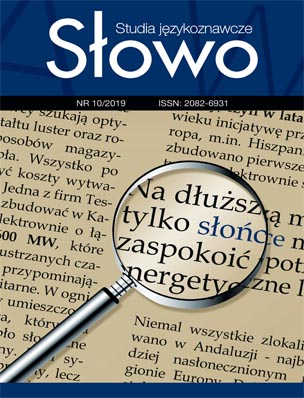Describing the indescribable, or the (un)translatability of the language of nature in British, Polish and German nature writing
DOI:
https://doi.org/10.15584/slowo.2019.10.10Keywords:
nature writing, human-nature relation, metaphors, synaesthesia, Michał Książek, Robert Macfarlane, Peter WohllebenAbstract
It goes without saying that words can distort or illuminate the way we perceive and emotionally experience the surrounding world and nature. Following this observation, the main objective of this paper is to pinpoint the possible linguistic expressions of nature. The underlying question can be formulated as follows: How can we adequately, accurately but nevertheless emotionally describe the subjective experience of nature and the relation human-nature? The analysis is based on three publications documenting growing interest of the literature in environmental issues: Robert Macfarlane’s “The Wild Places” [2017], Michał Książek’s “Droga 816” [2015] and Peter Wohlleben’s “Das Seelenleben der Tiere” [2016]. They represent the so-called nature writing: a well-established literary tradition in the Anglo-American literature, little-known in Polish and German literary landscapes.Downloads
References
Książek M., 2015, Droga 816, Białystok.
Macfarlane R., 2017, The Wild Places, London.
Wohlleben P., 2015, Das Seelenleben der Tiere: Liebe, Trauer, Mitgefühl – erstaunliche Einblicke in eine verborgene Welt, München.
Wohlleben P., 2017. Duchowe życie zwierząt, tłum. E. Kochanowska, Kraków.
Dobrzyńska T., 1994, Mówiąc przenośnie... Studia o metaforze, Warszawa.
Durczak J., 2010, Rozmowy z ziemią. Tradycja przyrodopisarska w literaturze amerykańskiej, Lublin.
Ginter A., 2016, Barwne synestezje Vladimira Nabokova [w:] Synestezja a sztuka, red. A. Rogowska, J. Kaleńska-Rodzaj, Kraków, s. 97–108.
Keil G., 1993, Kritik des Naturalismus, Berlin–NY.
Keil G., 2010, Naturalismuskritik und Metaphorologie [w:] Information und Menschenbild, red. M. Bölker, M. Gutmann, W. Hesse, Berlin–Heidelberg, s. 155–171, online: https://philarchive.org/archive/KEINUM [dostęp 4.11.2018].
Kolbuszewski J. (red.), 2000, Literatura i przyroda. Antologia ekologiczna, Katowice.
Kozłowska Z., 2016, Synestezyjna poezja Haliny Poświatowskiej [w:] Synestezja a sztuka, red. A. Rogowska, J. Kaleńska-Rodzaj, Kraków, s. 109–128.
Lakoff G., Johnson M., 1988, Metafory w naszym życiu, Warszawa.
Lilley D., 2017, New British Nature Writing, online: http://www.oxfordhandbooks.com/view/10.1093/oxfordhb/9780199935338.001.0001/oxfordhb-9780199935338-e-155?print= pdf [dostęp 5.10.2018].
Robiński A., 2018, Dobra droga do pogadania, „Tygodnik Powszechny” 37, s. 94–97.
Sierakowska J., 2011, Literatura i przyroda. Zmiana perspektywy?, „Przegląd Kulturoznawczy” 2 (10), s. 142–145.
Waldron K.E., Friedman R. (red.), 2013, Toward a Literary Ecology. Places and Spaces in American Literature, Lanham–Toronto–Plymouth.
https://www.deutschlandfunkkultur.de/manuskript-der-sendung-literatur-vom-9-juli-2017-wildnis.media.03a12ce44bff74048c809be26e38f238.pdf [dostęp 26.10.2018].
https://www.matthes-seitz-berlin.de/deutscher-preis-fuer-nature-writing.html [dostęp 4.10.2018]
https://sjp.pwn.pl/sjp/antropomorfizacja;2550250.html [dostęp 2.11.2018].
Downloads
Published
How to Cite
Issue
Section
License
Copyright (c) 2019 Słowo. Studia językoznawcze

This work is licensed under a Creative Commons Attribution-NonCommercial 4.0 International License.


